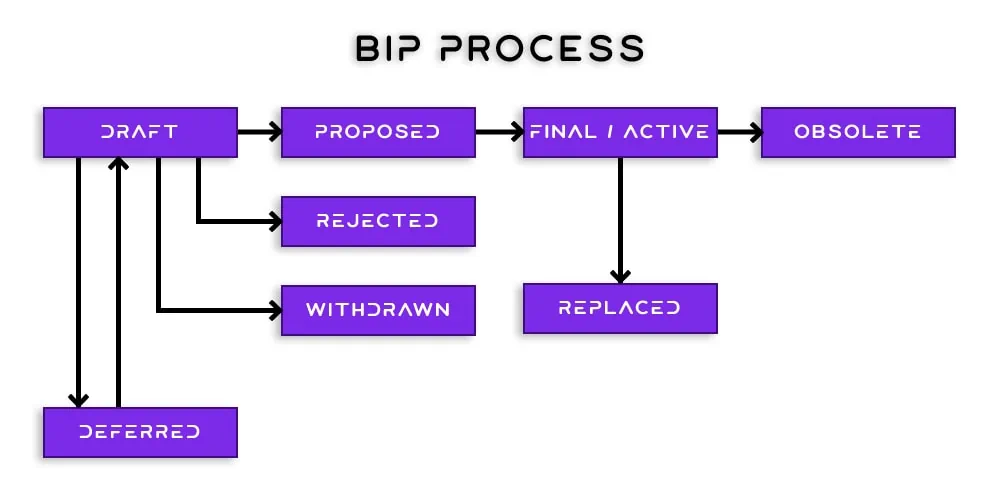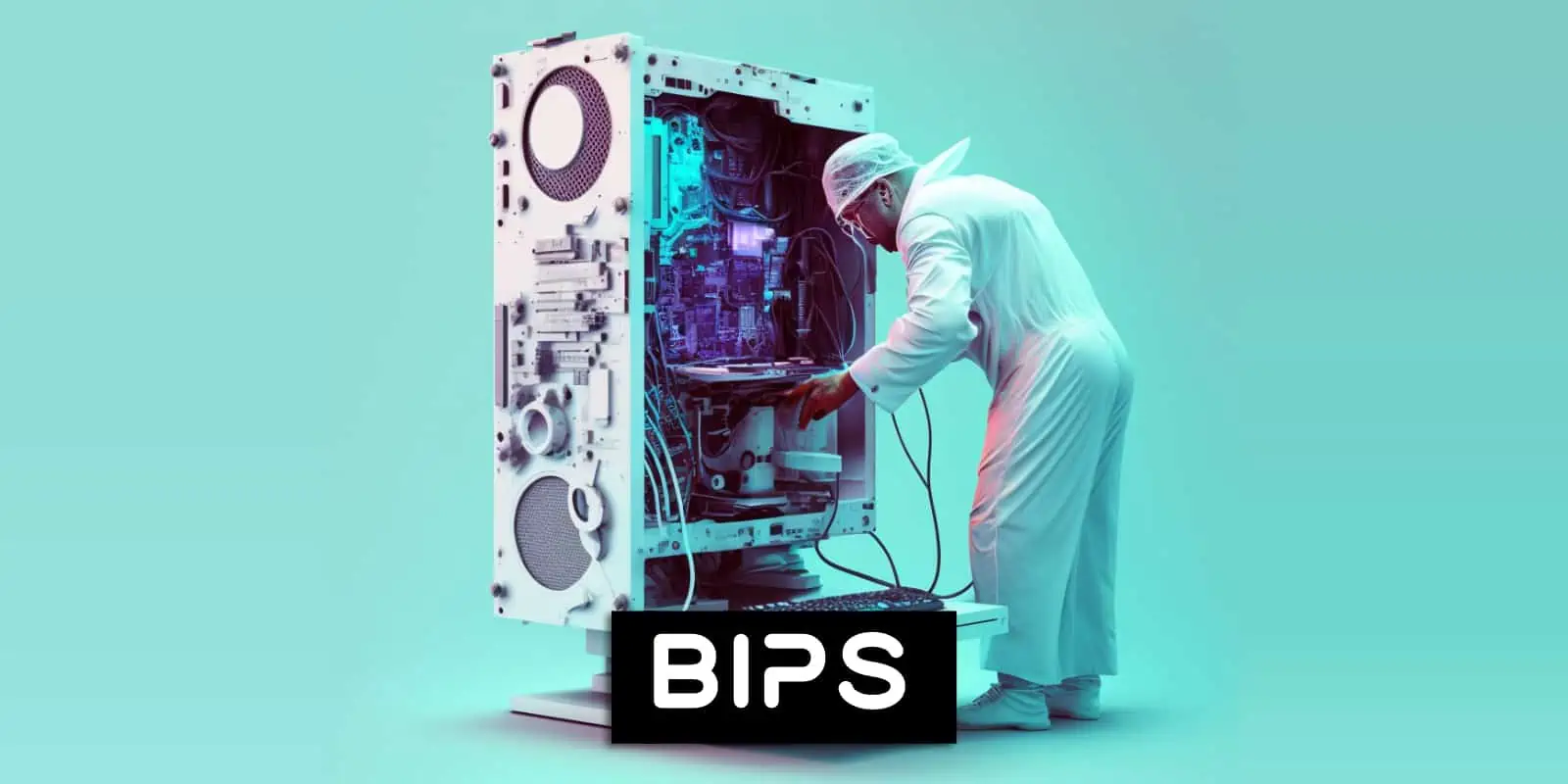Bitcoin is software that, just like any other software needs maintenance, upgrades and security fixes to keep it up to date and working properly. However due to its open source and fully decentralised nature there’s no traditional team, company or government that creates or enforces this. So in September of 2011, a programmer named Amir Taaki created the first Bitcoin Improvement Proposal.
Contents
What Is A Bitcoin Improvement Proposal?
A Bitcoin Improvement Proposal (BIP) is a formal way that any person can propose changes to Bitcoin. While many people think that “Bitcoin never changes” it has in fact gone through many changes, upgrades and improvements over the years thanks to BIPs.
These improvements include all the normal things you’d expect to see with software upgrades such as patching bugs, adding new features, simplifying code, making it more secure and more efficient. While most software is centralised, owned and coordinated by a single company, Bitcoin is free and open source software that is consensus based. The BIP process is how the Bitcoin community receives, assesses and potentially activates new changes to Bitcoin.
Learn More: 4 Breakthrough Characteristics Of Bitcoin
How Are BIPs Created?
Bitcoin Improvement Proposals can be created by any one, anywhere and at anytime. It’s recommended to search through the past BIPs and discussions to see if an idea has been considered before creating it. If not, then the first step is to post about the new idea in the Bitcoin development mailing list
Bitcoin is completely open to everyone, but just because you create a new Bitcoin BIP doesn’t mean it will gain approval by the broader Bitcoin community. When you submit a new idea to the community it may take many months or even years for it to be discussed and refined to a point where it can be assigned a BIP number and published to the Bitcoin Core BIPs repository by a BIP editor.
New to Athena Alpha? Start today!
Bitcoin Improvement Proposal Types
In order for it to be assigned a BIP number, it needs to be officially submitted with a specific format and structure set out in BIP 0002. Part of this format is the header preamble which includes the type of BIP. There are three different types of Bitcoin BIPs:
- Standards Track: These BIPs affect most or all Bitcoin implementations, such as a change to the network protocol, a change in block or transaction validity rules or any change or addition that affects the interoperability of Bitcoin applications
- Informational: These BIPs describe a Bitcoin design issue, or provides general guidelines or information to the Bitcoin community, but don’t propose a new feature. Informational BIPs do not necessarily represent a Bitcoin community consensus or recommendation, so users and implementors are free to ignore Informational BIPs
- Process: These BIPs describe a process surrounding Bitcoin, or propose a change to a process. Process BIPs are like Standards Track BIPs but apply to areas other than the Bitcoin protocol itself. They may propose an implementation, but not to Bitcoin’s code base and often require community consensus. Unlike Informational BIPs, they are more than recommendations, and users are typically not free to ignore them
Bitcoin Improvement Proposal Process
Once assigned a BIP number the BIP can then continue through the full process of Draft, Proposed and Active with various other states as needed such as Replaced or Withdrawn.

Moving from Draft to Proposed occurs when it the author (also called a champion) deems that it’s complete, has a working implementation for it and where the broader community plans on progressing it to the Final status. Moving from Draft / Proposed to Active has a bit higher bar to pass as explained by BIP 0002:
A Proposed BIP may progress to Final only when specific criteria reflecting real-world adoption has occurred. This is different for each BIP depending on the nature of its proposed changes
Bitcoin BIP 0002
For Process BIPs, they may be changed to Active when it has rough consensus on the mailing list, has been open to discussion for at least one month and no person maintains any unaddressed substantiated objections to it. For other BIPs it depends on whether they are a soft-fork or hard-fork BIP.
- Soft-Fork BIP: These require a strict clear miner majority expressed by blockchain voting and usage of the new BIP. It’s highly recommended that there is a super majority vote of around 95% before this threshold is met
- Hard-Fork BIP: These require adoption from the entire Bitcoin economy including those selling goods in bitcoins and Bitcoin holders who buy those goods. This adoption is indicated by the usage of the BIP, not just everyone “saying” they have adopted it
Learn More: What Is A Bitcoin Fork?
As the security and monetary policy of Bitcoin is of paramount importance, the bar for having a BIP set to Final or Active is clearly exceptionally high. This is to ensure that rich and powerful people or interest groups can’t just force unwanted changes upon the Bitcoin community.
Consensus of a Bitcoin Improvement Proposal must be shown by tens of thousands of node runners all voluntarily upgrading to that new software, millions of sellers and holders voluntarily using the new upgrades in their wallets and miners adhering to the new rules when they mine blocks.
This is what true decentralisation looks like and is why Bitcoin is both unchangeable and yet can be changed by anyone.
Some Top BIP Examples
- BIP 0001 & BIP 0002: BIP 0001 was the very first proposal created by Indian-British programmer Amir Taaki in Sep 2011. It defined the entire Bitcoin Improvement Proposal process and was later replaced by BIP 0002
- BIP 0091, BIP 0141 & BIP 0148: First shown at the Scaling Bitcoin conference in Dec 2015, these three BIPs combined to enable the Segregated Witness (SegWit) upgrade. This achieved the very high bar of 95% miner adoption in Sep 2017, almost 2 years later
- BIP 0340, BIP 0341 & BIP 342: After a proposal by Greg Maxwell in Jan 2018, these three BIPs outlined the Bitcoin Taproot upgrade that went live in Nov 2021, almost 3 years later
FAQ
Who Can Propose Changes To Bitcoin?
As Bitcoin is completely free and open source software, anyone is free to submit a Bitcoin Improvement Proposal (BIP) at any time. They should do so following the guidelines as otherwise it may be rejected or ignored.
Who Votes On Bitcoin Proposals?
Bitcoin proposals are not voted on in the traditional sense. Instead, they’re marked as Active when various thresholds are reached. For Process BIPs, this is when a rough consensus is reached on the mailing list. For other types it can require 95% of Bitcoin Miners to use the new BIP or for the entire Bitcoin network to use it before it’s considered Active.
Can Changes Be Made To Bitcoin?
Yes. There have been hundreds of upgrades, security fixes and changes to the Bitcoin Network over many years. These changes are managed using the Bitcoin Improvement Proposal process and are usually made over many months or years of discussion, drafting, testing and refinement.
Is There A Bitcoin Improvement Proposal List?
Yes. All Bitcoin Improvement Proposals are given a BIP number by the BIP Editors once they reach a certain stage. You can find this list on the Bitcoin BIPs repository.



